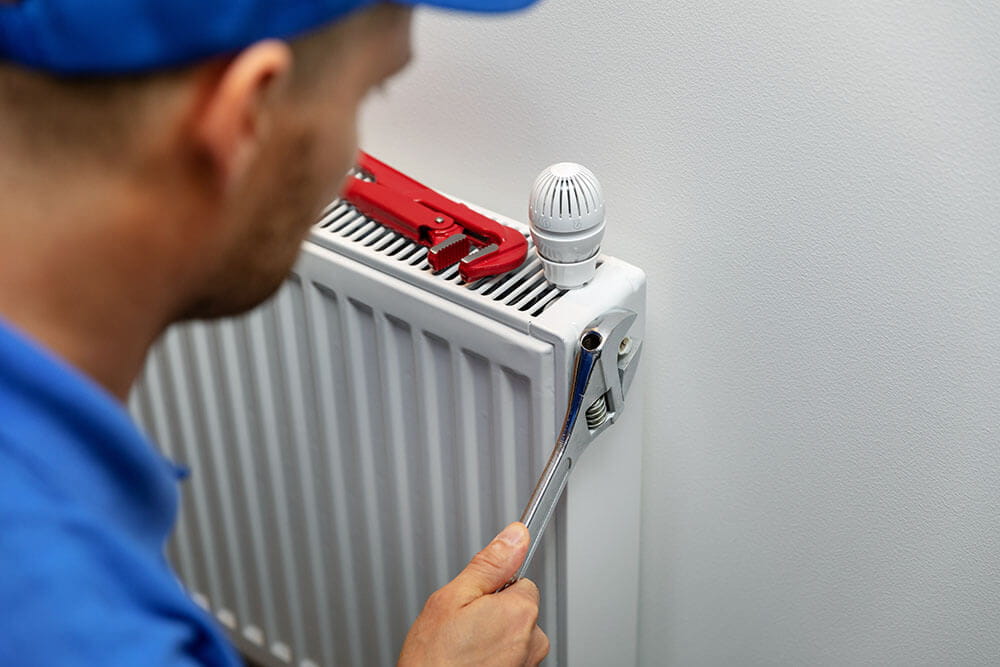
Hydronic Heating
Hydronic heating systems are becoming very popular in Australian homes. They use a boiler to heat water, pump it around to under floor coils or wall mounted panels, and then radiate the heat outwards. They typically run-on gas so have all the advantages of a gas heater except the heat is radiant, meaning energy from source to object is like the sun, and it heats very evenly leaving no hot or cold zones.
With hydronic heating, nearly endless hot water can be provided from the boiler throughout the year with a tankless heater, or indirect fired water heater. Indirect-fired water heaters don’t have a split-up fuel supply like a gas pilot light, but instead use the hot water produced by a boiler for domestic water heating. Our tank-within-a-tank design permits hot water generated by the boiler to diffuse in a steel outer tank which enfolds across an inner stainless-steel tank, diversifying heat by the walls of the inner tank, keeping a constant supply of hot water available.
If there are space restraints, a tankless heater – which is more like a wire through which tap water is distributed - can be installed in the boiler. In both situations, throughout the hot summer months when the heat in your house is blocked, the boiler functions at a low fuel level just like a typical water heater. The hydronic heating also permits the installation of a snow-melt-system. You can also install tubing under the driveways and sidewalks. Hot water is broadcast through them, and the snow melts down as quickly as it falls. Hydronic heating systems can also be adapted to heat greenhouses, swimming pools, and separate garages.
Benefits of Hydronic Heating
- Clean - hydronic heating systems are cleaner and they don’t create dirt. Dirt comes from air infiltration, cooking and tracking it in from the outside. Still, hot-air heating systems produce turbulence because they function with a blower. Quick agitation of the air leads to dirt particles getting stuck on furnishings, walls, drapes and curtains; even filters cannot efficiently control this situation. With a hydronic heating system, heat is slowly circulated evenly and without instant on-and-off cycles that cause turbulence. The hydronic heating system functions at a comparatively low temperature which allows you to keep a clean home.
- Durable - the cast-iron hydronic heating system can serve over 25 years because of the small number of moving parts and the material used. A warm-air heater, which has a lot of moving parts and needs constant changing of air filters, will generally last 10 – 15 years, with huge repairs at some points before the maximum life is reached.
- Cheaper - Hydronic heating systems are around 70 percent less efficient compared to the other procedures, such as electricity-dependent techniques. The systems may also be sealed, leading to low emissions. Additionally, forced air raises pressure and certainly will push heat through the openings from walls, windows, and insulating material. With hydronic heating, the warmer atmosphere is pushed gently into the nooks and corners of rooms. While upfront cost might be a little more, hydronic heating will cost approximately 20 per cent less to function than a ducted system, in a home or apartment with the usual ceiling heights. The bigger the homes; the higher the ceilings; the better the savings.
- Adaptable & versatile - there are no instant pushes of heat from one area to the other, reducing the need to keep particular doors open or closed. Even the temperature can be easily adjusted according to various zones. The radiant heating can be provided under the tiles and floors to deliver warmth to your feet and your pets in freezing winters. These systems can also serve as towel warmers.
- Comfort - sales of hydronic heating systems have increased significantly in recent years. Australians are catching onto the benefits. Heat is distributed evenly, you do not get bad smells like you can from gas heaters or ducted systems, and they’re not draughty because they’re pushing air with fans around a room or house. The temperature is controlled centrally and independent controls are also mounted on each panel, meaning that you can adjust temperatures in different rooms depending on your preferences.
- Efficiency - water from the boiler (the source) stays very hot on its journey around the house because it's a better conductor than air. Air in a ducted system cools quickly from the unit to the duct. Next, heat from the panel heats slowly, but it heats evenly and does not tend to gather unevenly near the roof or in corners. Lastly, hydronic heaters use a gas boiler. Gas is typically much cheaper than electricity, and has been shown to cost 50% to 60% less than it’s electrical counterpart.
- Health - hydronic heat is hygienic and gentle. There’s no draughts and no ducted system for the air to be passed through. Hydronic heating has major benefits for those with allergies or weakened immune systems. If you suffer from allergies and are prone to eye, nose, throat or skin allergies, then hydronic heating has big advantages and should be given careful consideration.
Why choose us?
Heating Experts offer repair, service and installation services to all major brands and types of hydronic heating systems. Reach out to us to hire the best technicians for hydronic heating system installation, cleaning, maintenance, repair and replacement. We are a team of professionals and we offer the best solutions to serve you and your family in the best way. Our experience in handling all types of heating systems makes us experts in heater services.
What we offer
- Quality service by qualified technicians
- Same day bookings
- Local expert technicians
- On time guarantee
- Exceptional customer service